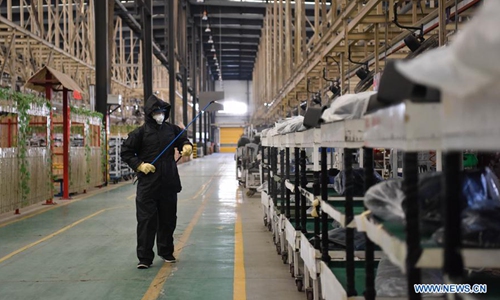HOME >> OPINION
It is naive to expect Chinese economy to collapse
Source:Global Times Published: 2020/2/18 12:13:40

A worker disinfects the factory of Chang'an Automobile in Dingzhou, north China's Hebei Province, Feb. 16, 2020. Companies in Dingzhou resumed production with epidemic prevention measures during the outbreak of the novel coronavirus. (Xinhua/Zhu Xudong)
It is clear that the novel coronavirus pneumonia will have a major impact on China's economic activity, which will translate into immediate pain for some companies and even disaster for those with weak resilience. But the outbreak will be short-lived, and it will not affect China's competitiveness or disrupt the country's overall development trend, which is probably the consensus of most economists around the world.Western public opinion has more recently assessed the impact of the public health emergency on the Chinese economy, and many of them have intentionally or unintentionally confused the short-term disaster caused by the outbreak with the long-term impact on the Chinese economy. These comments may have been mixed in with some people's hopes that China's future really will be like this. They can't help but magnify the significance of short-term events. Some of them could not help believing their own paradoxical logic.
The outbreak brought much of China's economic activity, especially in the service sector, to a halt, and some cities came to a standstill in order to allow the trajectory of the virus to emerge and be stopped. The losses are huge, of course, and the specific numbers are yet to be counted, but the absolute numbers are certainly staggering.
Yet China's sheer size means just as much maneuvering capability, and it is one of the most important indicators of strategic economic resilience. Some of the losses in services can be made up for, and a lot of them are lost, but they won't be an internal wound to the Chinese economy. Over time, subsequent economic developments will allow the wounds to heal.
While China's economy has suffered, there has been no disruption this time around. The sectors of the economy that support the daily needs of the Chinese are revving up. With the exception of emergency supplies such as face masks, which cannot be expanded to the level of demand, the supply of other daily necessities has not been reduced.
There are no problems in basic sectors such as electricity and internet, and even the delivery system, which requires a lot of manpower, has been rapidly restored in recent days. The vegetable supply that people are most worried about has not had serious problems. These show: The Chinese economy has a very strong and tight internal organizational capability, and both the government and the market have acted very effectively in this disaster.
Much of the focus of Western public opinion on the economy seems to be on differences of a percentage point or even a few tenths of a percentage point in GDP. But Chinese society also looks beyond the economy. There are some pains and difficulties in a short period of time, of course it is a problem, but it is also important for us to keep our competitiveness and the hope ahead.
The disaster has tested China's strategic responsiveness in an extreme way. Faced with a disaster of this magnitude and a panic that was spreading rapidly among the public, the Chinese government has been able to mobilize the whole of society quickly against the extremely dangerous challenge, and it did not take long to stabilize the epidemic control and the public's sentiment.
In fact, all economic disasters ended up being completely out of control with the collapse of public confidence. The outside world should see clearly this time. As long as China has the political system it has today, a collapse of confidence on that scale would never happen in China, so the Chinese economy won't have the kind of collapse that some American elites expect.
The Chinese society will try its best to reduce and recover the economic loss this time, and the government and the market will try their best to help the enterprises in trouble. At the level of social ethics, this is the test we need to go through now. Any gloat from abroad during this period is disgraceful. As for strategy, those who want China to suffer can stop. All we can say is that they think too much and are naive and like to deceive themselves.
RELATED ARTICLES:
Posted in: EDITORIAL